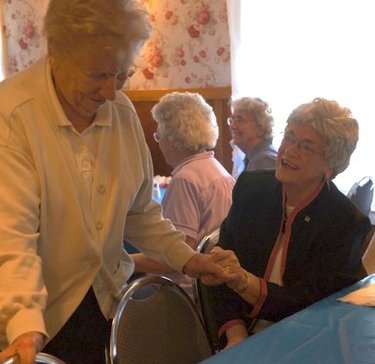Low numbers halt senior meals in South Westerlo
The Enterprise — Marcello Iaia
Bonds of the dining hall: Two women clasp their hands after a meal at the Hiawatha Grange Hall, where more than 80 people gathered to celebrate the re-opening of meals organized by the Helderberg Senior Services. The not-for-profit organization stopped meals after Aug. 9 because of low participation. Berne Supervisor Kevin Crosier, a member of the board, says that sharing at community meals is important and he hopes another similar program can be started in the Hilltowns.
SOUTH WESTERLO — Helderberg Senior Services’ board of directors decided diners were too few to continue its congregate meals, just a few months after re-opening and years of free, warm food for low-income or elderly patrons in the Hilltowns. A plan to open another meals site in the Hilltowns is underway.
“We just closed down because we weren’t getting the amount of people and the funding,” said Teresa Boles, site manager for the not-for-profit Helderberg Senior Services. The decision was made on Aug. 9.
The Albany County Department for Aging reimbursed Helderberg Senior Services on a per-meal basis. The site needed to serve 30 meals in order to break even, according to Kevin Crosier, who serves on the Helderberg Senior Services’ board of directors.
“We will do something eventually,” said Crosier, supervisor of the town of Berne. “And the new round for the funding isn’t until January. We could do something in the interim with the county because there are still meals that aren’t funded.”
Mary Rozak, spokeswoman for the Albany County executive’s office, said federal cuts known as sequestration lowered the department’s budget by 5.1 percent in June for federally-funded programs — senior nutrition, transportation, health promotion, and care-giver services — for the remaining six months of the fiscal year. Commissioner Judy Coyne of the Department for Aging said sequestration wasn’t a factor with the Helderberg Senior Services closing, though, because the cut reduced the total number of meals funded, which the South Westerlo site did not approach. Albany County has 20 congregate meal sites, said Rozak.
Crosier said a meals site in Berne or Knox could work because it would be more centrally located among the four Hilltowns, a church or the town-owned Foxenkill Grange Hall would have fewer overhead costs, and the a town van used for Knox and Berne seniors could be used to fill seats. He said the board of directors would meet to discuss the future of the Helderberg Senior Services, but could not say what role it would have in a new site.
“At this point, I haven’t approached the town board about anything,” said Crosier, referring to the use of the van. “Nobody knows where it will end up or how it will look.”
Boles and Coyne told The Enterprise in June that the organization had needed to replace aging members of its administration while the meals were halted from January through April. The dining room in the Hiawatha Grange Hall in South Westerlo was full during a re-opening event in June, with around 80 diners.
Those at the meal mourned the recent death of the hall’s long-time cook, Moses Van Zandt, who sometimes delivered meals to elderly people and whose cooking patrons praised. Before he worked at the grange hall, Van Zandt prepared meals as a nursing home cook for 17 years. For the elderly, he told The Enterprise in 1990, he used less salt and spices, with menu-planning handled by the Department of Aging.
The meals in the Hiawatha Grange Hall were served five days a week. Specific nutritional guidelines and age criteria are in place for congregate meal sites that receive reimbursements from the county based on the number of meals served. But the meals also benefit people whose spouses have died or who have family far away and want the conversation and card games.
“You’re coming there to meet people,” said Crosier, who grew up in Berne. “It’s kind of something that communities have been disconnected from for some years.”



